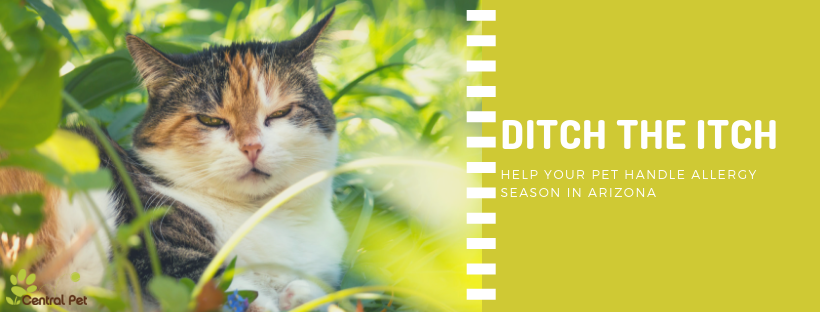When spring blows into Arizona, so do a slew of allergens--including ones that can be rough on our four-legged friends. Yes, it’s true! Seasonal allergies don’t just affect humans--your dog (or cat) deals with them, too.
Any pet can experience seasonal allergies, however, animals who live in warmer areas--where things are always blooming--are certainly prone to having a harder time than pets who live in areas where there is a true winter season. If you live in an area that doesn't have a hard freeze in the winter, environmental allergens can build up and cause year-round issues for your pet. Additionally, seasonal allergies can progress to year-round allergies. Why? Because the more your pet is exposed to the allergens he's sensitive to, the more intense and long-lasting his allergic response becomes.
While cleaning products, food, mold, and mildew are common allergy culprits, those are different than seasonal, or environmental allergens. Seasonal allergens that can trigger an allergic response in your pet include dust, dust mites, pollen, grass, and flea (or tick) bites.
Common Signs and Symptoms of Pet Allergies
 Allergies in dogs typically present themselves in the form of skin irritation or inflammation, which is often referred to as allergic dermatitis. You may find that your pet is scratching, chewing, licking, or biting uncontrollably. Or, you may notice that your pup has red, irritated skin, or even sores.
Allergies in dogs typically present themselves in the form of skin irritation or inflammation, which is often referred to as allergic dermatitis. You may find that your pet is scratching, chewing, licking, or biting uncontrollably. Or, you may notice that your pup has red, irritated skin, or even sores.
Other common signs and symptoms of seasonal allergies include a runny nose and puffy, watery eyes. Some allergens may even cause dogs to vomit or have diarrhea.
Keeping Pet Allergies Under Control
The good news is that there are several ways you can help your dog handle their seasonal allergies, which can include:
-
Grooming
Regular grooming with proper drying, flea, and tick treatments. Hypoallergenic shampoos, especially ones that contain oatmeal, can help clean without irritating the skin. You may also want to consider a leave-in conditioner or veterinary-prescribed topical treatment, which can help soothe skin irritations and infections. Adding olive or coconut oil to your pet’s food or administering it topically to their fur can also help keep his skin from itching.
-
Clean
Minimizing the amount of allergens in your home by cleaning and vacuuming the floors regularly. Also, aim to clean your pup’s bedding regularly as well. Be sure to use non-toxic household cleaning agents. Installing a home air cleaner or simply upgrading the air filters in your home can also be beneficial at reducing allergens.
-
Immune System Boost
Boosting your pet’s immune system. Keeping your dog’s immune system at an optimal level can help him manage allergies better. Make sure that you are feeding your pup a well-balanced diet free of unnecessary fillers and animal byproducts. Reducing the amount of grain your pup eats can also help with reducing triggers and inflammation. For an extra boost, add some omega-3 fatty acids to his or her diet.
-
Allergy Testing
Having your dog tested for allergies. Knowing that your pet suffers from seasonal allergies allows you to prevent those allergy symptoms and dreaded hot spots that can pose a serious risk to your pup. Your vet may also want to prescribe medication that can help.
Remember, your pet is as susceptible to allergies as you are. Be sure to talk with your vet if your pet is suffering from itching and allergies. If you are in the Tucson area, we welcome you to stop by for a visit with us; we carry products that could also help ease your pet’s suffering. Central Pet is here to help by offering professional grooming services, flea and tick treatments, and a wide variety of pet foods to cater to your pet's dietary restrictions.






